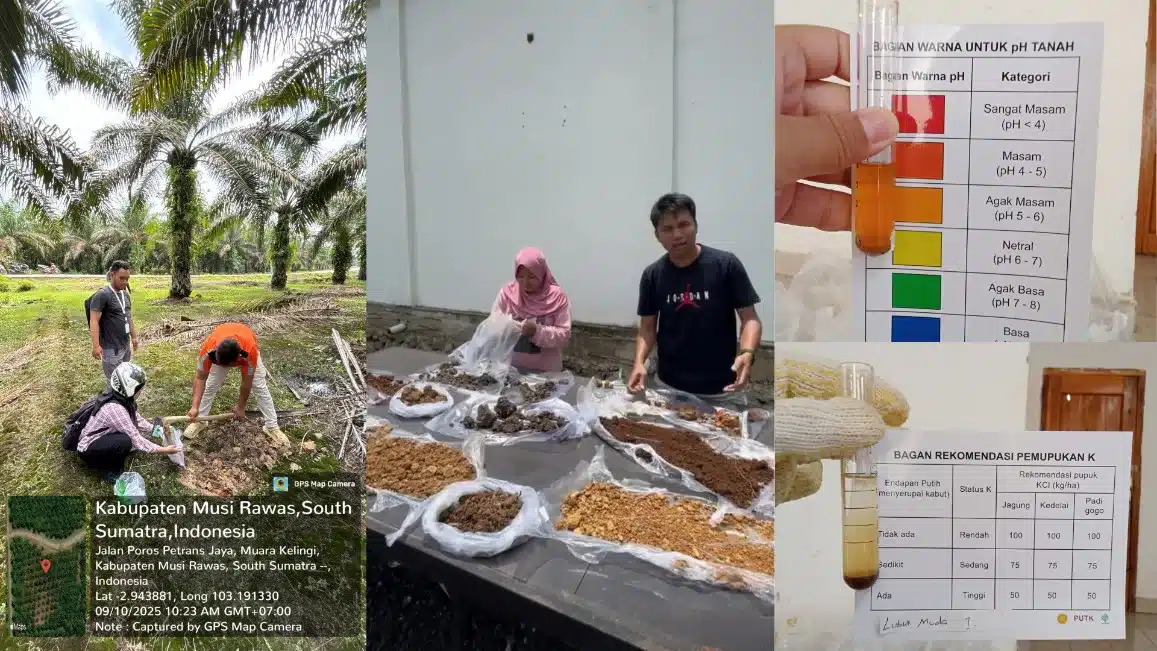UNDIP, Musi Rawas (September 26, 2025) – The Team 2 Patriot Expedition from Universitas Diponegoro (UNDIP), a collaboration between UNDIP lecturers and alumni together with the Ministry of Transmigration of the Republic of Indonesia, conducted soil sampling activities in Muara Kelingi District, Musi Rawas Regency, Sumatera Selatan Province.
This activity is part of an effort to map land resource potential in transmigration areas to support sustainable agriculture based on local potential. The soil test results will be used to recommend potential alternative crops, in addition to the existing ones, in the Musi Rawas transmigration area, Sumatera Selatan.
The team was led by Robetmi Jumpakita Pinem, S.AB., MBA., Ph.D., along with multidisciplinary alumni members: Adam Patria Nusantara, S.PWK., Muhammad Nadif Rizqulloh, S.I.Kom., Nadiroh, S.P., and Rizki Dwi Setyowati, S.T. Soil sampling was carried out across 21 villages and sub-districts within Muara Kelingi District, with support from local village officials.
During implementation, the team received hands-on assistance from local authorities, who provided field equipment, including hoes and soil sample containers. This support greatly facilitated fieldwork, especially in cultivation sites located far from settlements. The collaboration between the expedition team and village governments served as a tangible example of synergy between universities and communities in supporting participatory data collection.
Sampling was conducted at several cultivation sites for the community’s primary commodities, such as oil palm plantations and rice fields. The process involved digging 20–30 cm below the surface to obtain subsoil samples that represent the actual condition of the tillage layer. The collected samples were then sun-dried before further analysis in the field.

Preliminary analysis was carried out using the Dry Soil Test Kit (Perangkat Uji Tanah Kering / PUTK) by Nadiroh, S.P., an alumna of UNDIP’s Agroecotechnology undergraduate program. The tests focused on four key parameters: soil pH, phosphorus (P), potassium (K), and organic carbon (C-organic). Based on the results, most samples showed acidic soil conditions and relatively low nutrient content.
Acidic soil conditions are generally caused by high rainfall and nutrient leaching, which are common in tropical soils, particularly in areas with intense precipitation, such as the Musi Rawas sub-district. This leaching causes essential nutrients such as calcium, magnesium, and potassium to dissolve and wash away, reducing soil fertility.
Through this activity, the team hopes that the soil analysis results will serve as a basis for developing fertilizer recommendations and soil fertility improvement strategies, and will assist local governments and communities in determining land suitability for various crops. This soil sampling initiative also aligns with Sustainable Development Goal (SDG) No. 11: “Sustainable Cities and Communities.” Through this expedition, the UNDIP team contributes to the realization of ecologically balanced, economically productive, and socially sustainable transmigration areas—helping to shape a competitive, environmentally friendly regional development model.
Moreover, the transmigration area in Muara Kelingi can be developed more effectively and sustainably through a scientific approach that supports both community needs and the region’s local potential. (Public Communication/UNDIP/ Team 2 Patriot Expedition in Musi Rawas)










